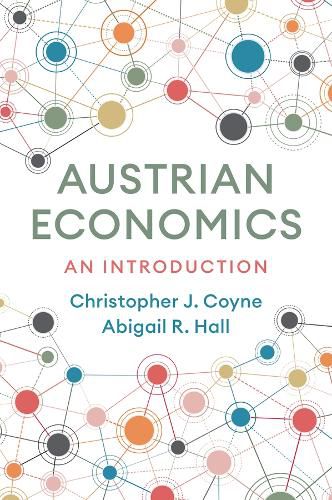Readings Newsletter
Become a Readings Member to make your shopping experience even easier.
Sign in or sign up for free!
You’re not far away from qualifying for FREE standard shipping within Australia
You’ve qualified for FREE standard shipping within Australia
The cart is loading…






How can people peacefully cooperate with others to improve their lives? This important book answers this question by introducing readers to the Austrian school of economics.
Austrian economics is a heterodox tradition with a distinct philosophy of science stressing purposive individual action, subjective value, the unique nature of economic knowledge, and the importance of prices and markets for coordination. Beginning in Austria in the 1870s with the work of Carl Menger, the ideas of those working in this tradition shaped the field of economics as we know it today. Coyne and Hall tell the story of the key thinkers and ideas in the Austrian school. In doing so, they demonstrate the tradition's ongoing relevance to a wide range of contemporary issues, including entrepreneurship, development, government regulation, artificial intelligence, business cycles and recessions, infectious diseases, recovery from natural disasters, and war.
Comprehensive and accessibly written, Austrian Economics: An Introduction is an indispensable resource on its topic. Readers will come away with a better understanding of economics and an appreciation of the marvel of human cooperation.
$9.00 standard shipping within Australia
FREE standard shipping within Australia for orders over $100.00
Express & International shipping calculated at checkout
Stock availability can be subject to change without notice. We recommend calling the shop or contacting our online team to check availability of low stock items. Please see our Shopping Online page for more details.
How can people peacefully cooperate with others to improve their lives? This important book answers this question by introducing readers to the Austrian school of economics.
Austrian economics is a heterodox tradition with a distinct philosophy of science stressing purposive individual action, subjective value, the unique nature of economic knowledge, and the importance of prices and markets for coordination. Beginning in Austria in the 1870s with the work of Carl Menger, the ideas of those working in this tradition shaped the field of economics as we know it today. Coyne and Hall tell the story of the key thinkers and ideas in the Austrian school. In doing so, they demonstrate the tradition's ongoing relevance to a wide range of contemporary issues, including entrepreneurship, development, government regulation, artificial intelligence, business cycles and recessions, infectious diseases, recovery from natural disasters, and war.
Comprehensive and accessibly written, Austrian Economics: An Introduction is an indispensable resource on its topic. Readers will come away with a better understanding of economics and an appreciation of the marvel of human cooperation.